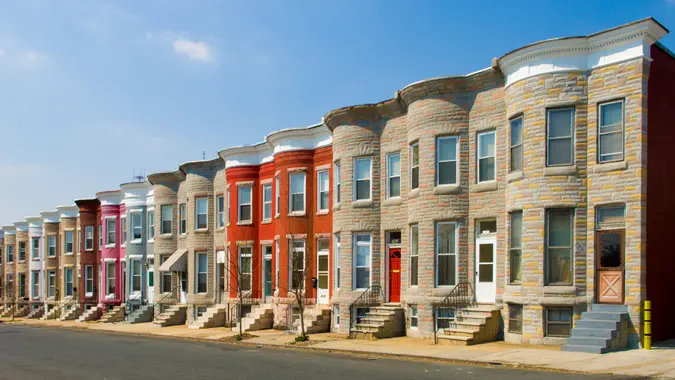What Happens if You Make Two Extra Mortgage Payments in a Year?

Commitment to Our Readers
GOBankingRates' editorial team is committed to bringing you unbiased reviews and information. We use data-driven methodologies to evaluate financial products and services - our reviews and ratings are not influenced by advertisers. You can read more about our editorial guidelines and our products and services review methodology.

20 Years
Helping You Live Richer

Reviewed
by Experts

Trusted by
Millions of Readers
In the quest to achieve financial freedom, homeowners often explore strategies to pay off their mortgages faster. One such strategy is making extra mortgage payments. Here’s how this approach can impact your journey to pay off your home early.
Read: 3 Ways To Recession-Proof Your Retirement
Understanding the Basics of Mortgage Payments
Before exploring the impact of extra payments, it’s essential to understand the structure of a typical mortgage payment. A mortgage payment primarily consists of two parts: the principal, which is the amount borrowed, and the interest, which is the charge by the lender for borrowing the money. Initially, a larger portion of the payment goes towards the interest, with a smaller amount reducing the principal. Over time, this ratio shifts, and more of your payment goes towards paying down the principal.
The Math Behind Extra Mortgage Payments
When you make two extra mortgage payments per year, you’re essentially paying more towards the principal, which has a compound effect. This extra amount reduces your principal balance faster than scheduled, leading to a reduction in the total interest paid over the life of the loan. Consequently, this can significantly shorten the term of your mortgage.
For instance, consider a 30-year fixed mortgage of $200,000 at a 4% interest rate. By making just two extra payments per year, you could shorten the term by several years and save thousands in interest. The exact figures can vary based on the loan amount, interest rate and the timing of the extra payments.
Pros of Making Extra Mortgage Payments
By opting for two additional mortgage payments annually, homeowners can enjoy a trio of benefits: significant interest savings, a quicker path to complete homeownership with a shorter loan term, and an accelerated increase in home equity, enhancing financial security and future borrowing potential.
- Interest savings: The most significant advantage is the reduction in total interest paid over the life of the loan. This saving can be substantial, depending on your loan’s original amount and interest rate.
- Shorter loan term: Paying off your mortgage faster means you can own your home outright sooner, providing financial peace of mind and stability.
- Increased home equity: Extra payments increase your equity in the property faster. This can be beneficial if you need to leverage your home equity for loans or refinancing in the future.
Cons of Making Extra Mortgage Payments
Making extra mortgage payments also has its downsides, like the risk of having less cash on hand, missing out on other investment opportunities, and the possibility of facing extra fees for early payments. These factors make it important to carefully think about your financial status and the details of your mortgage before deciding.
- Ability to acess your funds: Extra payments tie up cash that could be used for other investments or emergencies. It’s crucial to ensure you have a sufficient emergency fund before opting to pay extra on your mortgage.
- Opportunity cost: The money used for extra payments could potentially yield a higher return if invested elsewhere, especially in a market where interest rates on mortgages are low.
- Prepayment penalties: Some mortgages come with prepayment penalties. It’s vital to check your mortgage terms to ensure that you won’t be penalized for making extra payments.
How To Use Your Extra Mortgage Payments Effectively
To maximize the benefits of making extra mortgage payments, consider these steps:
1. Check With Your Lender
Before making extra payments, it’s crucial to communicate with your lender. Confirm that they accept additional payments without imposing penalties. Some lenders may have specific procedures for ensuring extra payments are applied to the principal rather than just advancing your next scheduled payment. This distinction is important because payments towards the principal directly reduce your loan balance and interest costs.
2. Evaluate Your Financial Stability
It’s essential to assess your overall financial health before committing to extra mortgage payments. Ensure that you have a solid emergency fund — typically recommended to cover 3-6 months of living expenses. This safety net ensures that additional payments towards your mortgage won’t leave you vulnerable in case of unexpected expenses or financial emergencies. Also, review your monthly budget to ensure that these extra payments do not overextend your finances.
3. Consider Your Financial Goals
Aligning your mortgage payment strategy with your overall financial objectives is important. For instance, if you have debts with higher interest rates (like credit card debt), it might be smarter to pay these off first. Additionally, consider your long-term financial goals such as retirement savings, investments and other major expenditures. The decision to make extra mortgage payments should fit into a broader financial plan.
4. Regular Extra Payments
Consistency in making extra payments is key to effectively reducing your mortgage term and interest costs. Plan these payments as part of your regular budget. This could mean setting aside a certain amount monthly or bi-monthly specifically for this purpose. Some people find it helpful to automate these extra payments, ensuring they don’t accidentally overlook them.
5. Use Windfalls Wisely
Financial windfalls such as work bonuses, tax refunds, an inheritance or other unexpected cash flows present an excellent opportunity to make extra mortgage payments without impacting your regular budget. Before using windfalls for your mortgage, consider if they could be more effectively used elsewhere in your financial plan. If not, applying them to your mortgage can substantially decrease your loan balance and interest costs over time.
Each of these steps involves careful consideration and planning, ensuring that making extra mortgage payments is not only feasible but also aligns seamlessly with your financial health and goals.
Final Take
Making two extra mortgage payments per year can be a powerful strategy to pay off your mortgage faster and save on interest. However, it’s not a one-size-fits-all solution. If you’re a homeowner, consider your overall financial situation, including emergency funds, other high-interest debts, and investment opportunities, before you dive in.
By understanding the math behind extra payments and carefully weighing the pros and cons, you can make an informed decision that aligns with your financial goals and helps you achieve homeownership free and clear sooner.
Editor's note: This article was produced via automated technology and then fine-tuned and verified for accuracy by a member of GOBankingRates' editorial team.
 Written by
Written by  Edited by
Edited by 

























